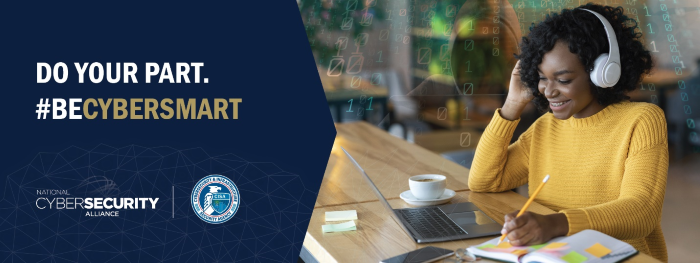Do Your Part. Be Cyber Smart.
Posted in In the news on October 5, 2020
October is National Cybersecurity Awareness Month (NCSAM). Now in its 17th year, NCSAM aims to raise awareness about the importance of cybersecurity across the country, ensuring that all Americans have the resources they need to be safer and more secure online. This year’s theme is “Do Your Part. #BeCyberSmart. According to the Department of Homeland Security, “this theme encourages individuals and organizations to own their role in protecting their part of cyberspace, stressing personal accountability and the importance of taking proactive steps to enhance cybersecurity.”
Online Privacy
The internet plays a major role in our daily lives. Many of us go online to shop, bank, connect with family and friends, and handle important records. These activities require you to provide personally identifiable information like your name, date of birth, account numbers, passwords and location information. Sharing personal information online presents inherent risks. There are steps you can take to #BeCyberSmart and reduce the risk of falling victim to cybercrime.
Did You Know?
- Almost 50 percent of Americans have had their personal information compromised by a data breach in the last five years.
- 70 percent of Americans feel that their personal information is less secure than it was five years ago.
- 72 percent of Americans believe that most of what they’re doing while online is being tracked by advertisers, technology firms and other companies.
- 52 percent of Americans say they have decided against using a product or service because they were worried about how much personal information was being collected about them.

Tips to Stay Safe
- Enhance your login protection
- Enable multi-factor authentication to ensure that the only person who has access to your account is you.
- Change up your password protocol
- Use the longest password that is allowed. Get creative and customize your standard password for different sites. Use password managers to generate and remember different, complex passwords for each of your accounts.
- Stay current
- Keep your software updated to the latest version(s) available. Turn on the option for automatic updates.
- Limit information on social media
- Disable location services that allow anyone to see where you are—and where you aren’t—at any given time. Keep Social Security numbers, account numbers and passwords private, as well as specific information about yourself, including your full name, address, birthday and even vacation plans.
- Keep an eye on your apps
- Check your app permissions and use the “rule of least privilege” to delete what you don’t need or no longer use. Say “no” to privilege requests that don’t make sense. Only download apps from trusted sources.
- Watch out for suspicious emails
- If you’re unsure of the sender, don’t respond to the email. Avoid clicking on links or downloading attachments from such emails. When available, use the “junk” or “block” option to no longer receive messages from suspicious senders.
- Stay protected while connected
- Before you connect to any public wireless hotspot, confirm that the network is legitimate. If you do use an unsecured public access point, avoid sensitive activities that require passwords or credit cards. Only use sites that begin with “https://“ when online shopping or banking.